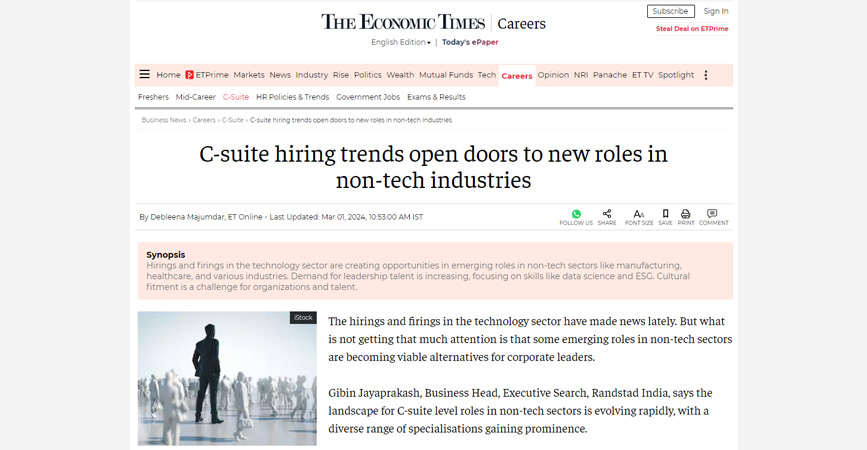
Synopsis: Hirings and firings in the technology sector are creating opportunities in emerging roles in non-tech sectors like manufacturing, healthcare, and various industries. Demand for leadership talent is increasing, focusing on skills like data science and ESG. Cultural fitment is a challenge for organizations and talent.
The hirings and firings in the technology sector have made news lately. But what is not getting that much attention is that some emerging roles in non-tech sectors are becoming viable alternatives for corporate leaders.
Gibin Jayaprakash, Business Head, Executive Search, Randstad India, says the landscape for C-suite level roles in non-tech sectors is evolving rapidly, with a diverse range of specialisations gaining prominence.
He gives the example of chief innovation officers (CInO) in manufacturing and other traditional sectors. The primary role here is to lead efforts in fostering innovation in products, processes and business models, ensuring organisations stay ahead and relevant in a competitive market. Jayaprakash says the role of chief health and wellness officers (CHWO) are becoming prominent in healthcare, hospitality manufacturing and finance sectors. The primary role of CHWOs is to prioritise employee health and well-being, recognising its impact on productivity. Chief sustainability and risk officers (CSRO) are another emerging option in many sectors. These leaders have to navigate the challenges of environmental, social and governance (ESG) factors to ensure long-term business resilience. Balancing sustainability and risk management is key here.
“These roles reflect the dynamic nature of leadership in non-tech industries, emphasising the importance of innovation, employee well-being and holistic sustainability,” Jayaprakash says.
Major non-tech sectors that have been witnessing hiring are chemicals, energy and pharma, says Venkatesh GB, Vice President, Industrial Practice, WalkWater Talent Advisors. Both India and multinational corporations in these sectors are seeing demand for leadership talent. “There has been increased demand for leadership talent in the GCCs of non-tech industries. Large MNCs are moving global roles to India and this has resulted in demand for talent in their GCC setups and India business organisations,” he says.
Bringing another nuance to the kind of roles that are emerging, Venkatesh says GCCs have been hiring global roles in AI, R&D and shared services. The business roles that are in demand include marketing, strategy and finance functions. In terms of specific skills, he says data science, advanced analytics and AI are the sought-after skills in both tech and non-tech.
“Majority of the organisations are putting their efforts to utilise these technologies to be more effective in their businesses. ESG is gaining a lot of traction as this is tied directly with energy and the way energy is consumed. Lots of organisations are investing in becoming net carbon zero organisations and so ESG skill is in demand. This also helps the organisations towards adopting green energy. In the finance function, the focus is towards getting a leader who can manage profitability without compromising much on growth. Hence, leaders with a proven record of navigating through tougher economic situations are more in demand,” he adds.
What this means in terms of skills and leadership
This shift means people in these leadership positions will need to develop certain skills.
Sarbojit Mallick, co-founder of Instahyre, says, “By 2024, non-technical leadership positions will represent more than just a job title. They will represent innovative thinking, revolutionary stewardship and guardianship of advancement. They will support a new paradigm of leadership because they understand that success in the modern environment requires not only traditional proficiency but also agility, adaptability and an unwavering pursuit of perfection.”
When it comes to salary comparisons, Jayaprakash says the Indian IT sector has been a dominant force, consistently providing competitive compensation packages. The post-Covid landscape has only accentuated this trend, with a noticeable uptick in salaries across all levels, especially for roles requiring niche skills.
“The principles of economics, with supply and demand at the forefront, play a pivotal role in driving these salary hikes. In contrast, the non-IT sector, encompassing industries like manufacturing, infrastructure, energy, consumer goods, retail and pharma, exhibits a different dynamic. While the non-IT segment is generally more stable, the compensation landscape for CXO roles within these sectors often sees a discernible gap of 20-30%, contingent on the scale and turnover of the organisation. While expecting a 100% fitment may be unrealistic, the past 10-15 years have seen significant strides in narrowing the gap. Indian talent has been exposed to diverse opportunities, resulting in a pool of candidates well-suited for various roles,” he adds.
Jayaprakash clarifies that the challenge often lies in cultural fitment and aligning expectations between organisations and talent and, hence, it is essential for both parties to have realistic expectations and foster a mutually beneficial partnership.
Source: The Economic Times








